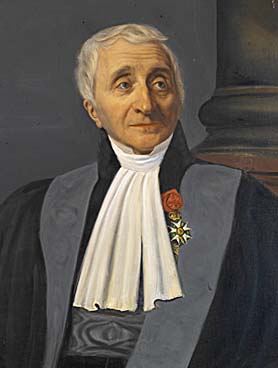Joseph Diez Gergonne facts for kids
Quick facts for kids
Joseph Diez Gergonne
|
|
|---|---|
 |
|
| Born | 19 June 1771 Nancy, France
|
| Died | 4 May 1859 (aged 87) Montpellier, France
|
| Scientific career | |
| Fields | Mathematics Logic |
Joseph Diez Gergonne (born June 19, 1771, in Nancy, France – died May 4, 1859, in Montpellier, France) was a clever French mathematician and logician. He made important contributions to geometry and how we think about math.
Contents
Life
Early Life and Military Service
Joseph Gergonne joined the French army in 1791 as a captain. The French government was worried about other countries invading. They wanted to stop the French Revolution and put King Louis XVI back on the throne. Gergonne fought in the big battle of Valmy on September 20, 1792.
He later left the army for a short time. But he was called back to serve again. He took part in the French invasion of Spain in 1794.
Becoming a Professor
In 1795, Gergonne and his army group went to Nîmes. Here, he decided to leave the military for good. He became a professor of "transcendental mathematics" at a new school called the École centrale. He was influenced by Gaspard Monge. Monge was the director of the new École polytechnique in Paris.
Starting a Math Journal
In 1810, Gergonne found it hard to publish his math work. So, he started his own math journal. Its official name was Annales de mathématiques pures et appliquées. But most people just called it the Annales de Gergonne.
The journal mostly featured articles about geometry, which was Gergonne's special area. Over 22 years, Gergonne published about 200 of his own articles. Many other famous mathematicians also published their work there. These included Poncelet, Steiner, and even Galois.
Later Career
In 1816, Gergonne became a professor of astronomy at the University of Montpellier. He was later made the Rector (like a principal) of the university in 1830. When he became Rector, he stopped publishing his math journal. He retired from his work in 1844.
Work
New Ideas in Geometry
Gergonne was one of the first mathematicians to use the word polar. Starting in 1810, he wrote many papers about the principle of duality in projective geometry. He noticed that in geometry, if you have a rule about points and lines, you can often switch them around to get another true rule. This works as long as the rule doesn't involve measurements.
Gergonne also supported using analytical geometry. This is a way to solve geometry problems using coordinates and algebra. In 1814, he found a clever way to solve the classic problem of Apollonius. This problem asks you to find a circle that touches three other circles. Gergonne's solution showed how powerful these new methods were.
Thoughts on Math and Discovery
In 1813, Gergonne won an award for his essay. It was called Methods of synthesis and analysis in mathematics. This essay was never published, but we know about it from a summary. It showed Gergonne's ideas about math.
He thought the words analysis and synthesis were confusing. He suggested we stop using them. Even though he was a geometer, he believed that algebra was more important than geometry. At that time, algebra was mostly about basic math with real numbers. He even predicted that one day, machines would help discover new math results.
Designing Experiments
In 1815, Gergonne wrote the first paper on the best way to design experiments. This was for something called polynomial regression. According to a historian named S. M. Stigler, Gergonne was a pioneer in this field. He helped create ideas like optimal design and response surface methodology. These methods help scientists plan experiments to get the most useful information.
In 1818, he published an essay called "Essai sur la théorie des définitions" (An essay on the theory of definition) in his journal. This essay is known for being the first to recognize and name the idea of implicit definition. This is when something is defined by how it's used, rather than a direct statement.
Quote
- "It is not possible to feel satisfied at having said the last word about some theory as long as it cannot be explained in a few words to any passer-by encountered in the street."
 | Georgia Louise Harris Brown |
 | Julian Abele |
 | Norma Merrick Sklarek |
 | William Sidney Pittman |

